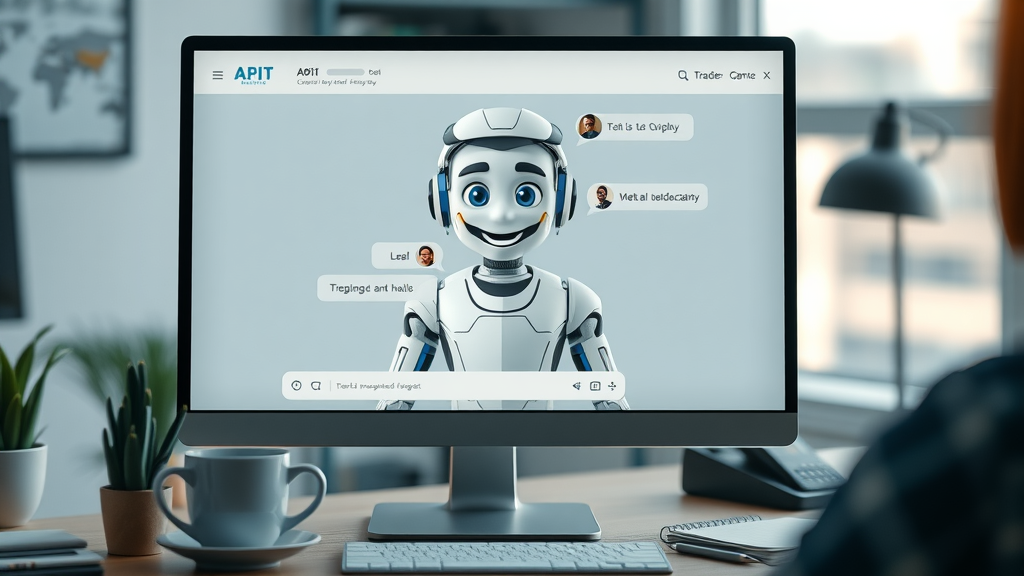Did you know that over 60% of customer service interactions in the trades are now touched by AI tools? In plumbing, HVAC, and electrical services, conversational AI is quickly becoming the first impression your customers get. Yet, the question remains: can AI agents truly match (or even surpass) the expertise and empathy of your seasoned support team? This deep dive uncovers whether AI customer service is merely a trend—or the future foundation of winning, efficient trades businesses.
AI Customer Service: The Data Behind the Disruption
The shift toward AI customer service in trade industries is more than just a buzzword—it's a data-driven reality. Recent studies show that businesses adopting ai agents or other ai tools for customer support have slashed their average response times by up to 50%, while seeing noticeable gains in customer satisfaction scores. By harnessing generative AI and conversational AI, trades businesses can process and reply to more inquiries, all while handling spikes in demand with remarkable consistency.
More importantly, integrating artificial intelligence into core support team operations enables companies to understand customer needs faster through sentiment analysis and natural language processing. This translates to faster, more relevant solutions for customers, accepted quotes, and even scheduled appointments—all while reducing the strain on human agents. With the demand for skilled labor climbing, ai in customer service offers scalable support without sacrificing the personal touch that defines successful trades businesses.

What You'll Learn About AI Customer Service in the Trades
- Key benefits and challenges of implementing ai customer service
- How ai agents compare to traditional customer support teams
- Popular AI tools used for conversational ai and generative ai in the trades
- Real-world examples of ai in customer service
- Must-have skills for running effective AI customer service workflows
Understanding AI Customer Service: Core Concepts
What is AI Customer Service? (customer service, ai in customer, ai agent)
AI customer service uses powerful algorithms and data to support or automate customer support inquiries, appointments, and troubleshooting in real-time. Powered by artificial intelligence, these systems can process natural language—the way humans speak and type—to interpret and respond to messages just like a human agent. Terms like ai in customer service and ai agent refer to software components that act as digital assistants, helping to resolve customer inquiries or escalating issues to the right support team member if advanced attention is needed.
This blend of natural language processing and machine learning enables AI agents to continually learn from customer conversations. They develop a growing knowledge base of trade services, parts, and customer behavior—making future responses faster and more accurate. The result? Stronger customer support and a seamless service experience for every inquiry routed through your systems.
How AI Agents Transform Customer Support
AI agents deliver significant advantages for trades businesses, transforming static customer support lines into dynamic, always-available digital service hubs. Unlike traditional human agents—who face limits on work hours or throughput—AI agents provide consistent responses regardless of time or volume. This is a game-changer for businesses with fluctuating demand or a need to handle urgent after-hours requests.
Moreover, AI-powered systems can be programmed with scripts tailored to your industry, ensuring terminology like “water heater flush,” “HVAC zoning,” or “breaker box issue” are instantly understood. This level of customization empowers your support team to spend more time addressing complex issues rather than triaging routine customer inquiries. It also ensures that the customer experience remains personalized and accurate, building trust and satisfaction even when a human agent isn't immediately available.

Generative AI and Conversational AI: Key Tools for Customer Service
Generative AI and Conversational AI are central to the evolution of customer service in the trades. Conversational AI allows for interactive, human-like discussions and is adept at simulating support conversations via chat, text, or even voice. By using advanced natural language processing, these tools decode customer questions and provide intelligent, context-aware answers—making them adept at troubleshooting and responding at scale.
Generative AI, by contrast, does more than repeat scripted responses. It crafts new, personalized replies by drawing from a business’s documentation, knowledge base, and even recent call transcripts. This allows AI solutions to adapt on the fly to unique requests, issues, or feedback. Combined, these AI tools empower businesses to meet a wide variety of customer needs efficiently, while ensuring even the most technical or time-sensitive questions receive immediate and actionable solutions.
The Benefits of AI Customer Service for Trades Businesses
- 24/7 Availability and fast response times: AI agents never sleep. Customers get instant support, even after hours or on weekends, building trust and higher customer satisfaction.
- Reduced staffing costs for support teams: By automating routine interactions, your business can lower overhead costs and free up human agents for high-value work.
- Enhanced customer experience through personalized, natural language responses: AI tools use advanced language models to deliver tailored recommendations and helpful solutions with each conversation.
- Advanced sentiment analysis and language processing to assess customer needs: AI systems leverage built-in sentiment analysis to detect frustration, urgency, or confusion—routing inquiries accordingly and improving outcomes.
- Scalability for growing service providers: AI customer service scales to handle hundreds of conversations simultaneously, giving trade businesses the flexibility to grow without sacrificing support quality.
“AI customer service allowed us to cut response times in half and handle twice as many leads, without increasing staff.” – Trades Business Owner
Challenges of Adopting AI Customer Service in the Trades
- Training AI agents for industry-specific terminology: The language of trades is unique (think “gas valve,” “split system,” or “breaker panel”). Ensuring your AI agent understands these terms requires a rich, tailored knowledge base and proper training.
- Balancing automated and human customer support: Machines excel at routine tasks but can stumble on nuanced cases. Blending AI with live human agents guarantees high-quality service and a positive customer experience for every interaction.
- Privacy, security, and compliance with sensitive customer data: Trades businesses deal with addresses, payment info, and more. Strong data privacy protocols and compliance checks are essential when deploying AI in customer-facing roles.
- Managing expectations around machine learning limitations: AI tools are improving fast, but they’re not perfect. Keeping communication transparent about what AI can—and can’t—do in customer service is key to lasting trust.

Comparing AI Customer Service Solutions: Key Players and Tools
| Tool | Natural Language Processing | Sentiment Analysis | Industry Adaptability | Cost |
|---|---|---|---|---|
| TradeBot Pro | Advanced | Yes | High (customizable for trades) | $$$ |
| ServiceGenie AI | Moderate | Yes | Medium | $$ |
| Converso Support Suite | Advanced | Basic | Medium | $$ |
| ChatWise Trades Edition | Basic | Yes | High (modular for HVAC, Plumbing, Electric) | $ |
Machine Learning and Natural Language Processing Features
The best ai customer service solutions for the trades harness two core technologies: machine learning and natural language processing. Machine learning ensures that each interaction—whether it’s booking an appointment, fielding a product question, or troubleshooting an issue—helps the system get smarter and more effective over time. This continuous learning is what keeps your response quality high and relevant.
Meanwhile, natural language processing allows AI agents to understand questions phrased in a thousand different ways (“My AC broke,” “air isn’t blowing,” “is my compressor dead?”) and respond accurately. This lets businesses deliver human-like support at scale, without overwhelming your support team. By evaluating ai tools based on these features—as well as factors like cost and adaptability—you’ll quickly find the right match for your business’s unique needs.

Case Studies: Customer Experience Improvements with AI Agents
- Plumbing company automated appointment scheduling using AI agent: By deploying an ai agent, this business reduced manual scheduling work by 70% and improved booking accuracy, freeing support teams to handle urgent repair calls.
- HVAC repair leveraged generative AI for troubleshooting FAQs: Generative AI produced custom repair guides and automated diagnostics, reducing callback rates and helping customers solve basic problems before a tech arrives.
- Electrical trade firm improved customer support team's efficiency by integrating AI customer chatbots: With the chatbot fielding first-level queries and FAQs, the human support team could devote more time to solving complex installation issues—resulting in higher customer satisfaction scores and faster resolution times.
Sentiment Analysis: Monitoring Quality of Customer Interactions
Modern ai customer service systems do more than log conversations—they also perform sentiment analysis to assess the emotions and urgency behind customer interactions. This is especially useful in the trades, where frustration from plumbing leaks or electrical outages can escalate quickly. AI tools equipped with sentiment analysis automatically flag negative interactions, alerting supervisors or support teams to step in when needed. In turn, this helps ensure that every issue is handled with the empathy and attention expected from a trusted service provider.
The combination of machine learning and language processing means that your AI agent can detect stress, satisfaction, or confusion in real time and escalate to a human agent as necessary. This makes for more nuanced, responsive customer service—ultimately driving loyalty and repeat business for your trade company.

Best Practices for Integrating AI Customer Service Into Your Business
- Assess existing customer support workflows: Review where AI integration could make the biggest difference: appointment scheduling, common troubleshooting, or post-service feedback?
- Select the right AI tool or AI customer service solution: Match feature sets like natural language processing and sentiment analysis to your geographic and technical needs.
- Train AI agents on industry-specific language: Customize scripts and databases to reflect your trade so AI agents can truly “speak your customer’s language.”
- Monitor and adjust machine learning outputs regularly: Use performance dashboards and conversation audits to keep your AI customer service sharp and current.
- Balance automation with personalized, human support when needed: Always provide an easy “human handoff” for complex or sensitive customer cases to maximize customer satisfaction and retention.
“The key to successful AI customer service in the trades? A seamless collaboration between support teams and smart automation.” – AI Industry Analyst
People Also Ask About AI Customer Service
What is the best AI for customer service?
The best AI for customer service depends on your business’s needs. Leading solutions like TradeBot Pro and ServiceGenie AI stand out for their advanced natural language processing and adaptable workflows. The right choice offers industry-specific language processing and easy integration with your support tools, ensuring smooth, consistent customer interactions every time.
Is there AI customer service?
Yes, AI customer service is widely available and used across industries, including the trades. AI-powered chatbots and digital assistants help manage customer inquiries 24/7, providing solutions, scheduling, and support while seamlessly connecting to live agents when needed for complex issues.
What is an example of AI in customer service?
An HVAC company might use a chatbot to handle common booking requests and simple troubleshooting. If a customer says, “The heater won’t start,” the AI provides step-by-step guidance pulled from a knowledge base, collects details, and, if the issue needs escalation, books a service call instantly.
What skills are needed for AI customer service?
Running AI customer service requires both technical and interpersonal skills. Teams should be familiar with AI tools, configuring machine learning models, and training AI agents. It’s also vital to monitor customer conversations for quality and coordinate effective handoffs to human agents for sensitive tasks.
Key Takeaways for Trades Businesses Considering AI Customer Service
- AI customer service is proven to streamline support and improve customer experience.
- Choosing the right ai tool and training ai agents is critical for industry success.
- Balancing automation with human interaction ensures the best results.
- Invest early in platform integrations and ongoing machine learning optimization.
FAQs on AI Customer Service
-
Can AI customer service replace human support teams entirely?
No. While AI can handle routine tasks and increase efficiency, human agents are still essential for complex or sensitive customer cases, maintaining empathy, and delivering personalized service. -
How secure is generative AI for handling customer data?
Generative AI systems can be made highly secure with proper protocols. Choose solutions with robust data privacy features, end-to-end encryption, and compliance options tailored for trades businesses. -
What are the startup costs for implementing AI in customer service?
Initial investments vary: from affordable subscription-based chatbots for small businesses to custom solutions with robust integration. Expect costs for training, setup, and regular maintenance. -
How do I measure the ROI of AI-based customer support?
Key metrics include reduced response times, increased customer satisfaction scores, ticket resolution speed, and overall savings in staffing. Monitoring these will help illustrate your AI investment’s value.
Ready to Transform Your Customer Service?
Modern trades businesses have a choice: wait for the future to take hold or lead the charge. Harness the power of AI customer service to streamline your operations, improve customer satisfaction, and boost your bottom line. Book a Free Consultation or text Us 720.892.5968
 Add Row
Add Row  Add
Add 




Write A Comment